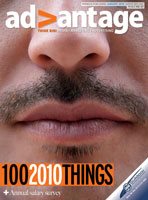
Subscribe & Follow
Advertise your job vacancies
Jobs
- Bookkeeper Stellenbosch
- Project Manager George
- Social Media Manager Johannesburg
- Area Sales Manager - Industrial Equipment Cape Town
- External Sales Representative - Exports Vereeniging
- Service Advisor Pinetown
- Accounts Assistant - Sectional Title Management Johannesburg North
- Account Manager Ekurhuleni
- Internal Sales Support Cape Town
- Projects and Environmental Officer Cape Town
100 things for 2010
A special January 2010 edition of AdVantage, which focuses on what we can expect from 2010 across the media, marketing and advertising industry, includes the predicted 100 ‘things' that you should watch out for in 2010. JWT Johannesburg has collated this in collaboration with Ann Mack, its global trend expert.
The feature plus the January AdVantage cover design was conceptualised and designed by JWT Johannesburg and promises to be an interesting and out-of-the-box read, from the Vuvuzela and Skype to Chicken Licken and Bacon!
“When the January issue hits your desk, you won't believe what's coming back ‘in' this year,” says Louise Marsland, editor-in-chief. “Moustaches for one... although, as JWT states, the guys in Pretoria have been ahead of trends for a while!”
“These aren't trends or fads or predictions. These are things. Things you will want, or be forced, to spend time with in 2010. Some are interesting and some are not. Good luck!” says Judy van Dam, the MD of JWT Johannesburg.
Some predictions
- France's Joie de Vivre Index: initiated by French President Nicolas Sarkozy, it is intended to provide a better assessment of wellbeing than the classic measure of economic health, the GDP.
- Mass tailoring: companies like OUTsurance and DSTV are getting around stretched budgets by being more flexible with their product offerings.
- Fix yourself: as more and more information and knowledge about the link between emotional and physical wellbeing are dispersed, we will continue to see a growth in the ‘Self Help/Personal Development' category as people look for answers beyond traditional medicine.
- Augmented Reality (AR): the superimposing of digital information over physical reality, will make its way into the hands of mass audiences. AR apps for smartphones can show where subway entrances are located, reveal prices of nearby homes or label landmarks for tourists.
- Energy Diets: Power cuts have prompted more businesses and consumers to put themselves on an ‘energy diet' (buying more energy-efficient machines, keeping lights off longer, etc.







